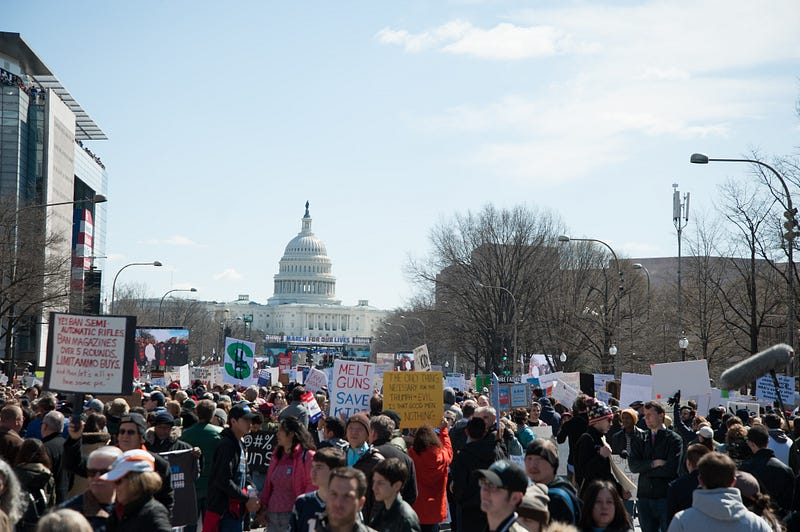
In the wake of the shooting at Stoneman Douglas High School in Parkland, F.L., in which 17 people were killed and 17 more were wounded, this nation has been embroiled in a newly invigorated conversation about the regulation of the ownership of firearms. This conversation culminated in its most visible form in the March For Our Lives, a protest organized by student survivors of the shooting, that took place on Saturday, March 24 in Washington, D.C., and more than 800 other U.S. cities.
Below are brief accounts from two members of the Hamilton community who attended this protest, Luke Carstens ’21 and Ben Katz ’20, exploring their motivations for attending and hopes for the future.
Describe the protest. How many people were there, where was it, what was the general mood and atmosphere?
Katz
: I went to the March for Our Lives on the Upper West Side and Midtown neighborhoods of Manhattan. I’m not sure of the specific number, but I think it was around 150,000 people. Overall, the mood was passionate.
Carstens
: I went to the march in Washington D.C. There were tens of thousands if not hundreds of thousands of people there. The mood was mostly determined, not wildly passionate, but definitely pulsing for change.
What were your motivations or inspirations for going?
Katz
: My mom was formerly a classroom teacher and principal, so making schools as gun-free as possible is an important issue for her, and therefore me.
Carstens
: I went because I want the nation to know how strongly I feel about the issue of gun control, and so legislators would keep this in mind while campaigning this year.
What changes do you hope to see going forward with regards to this nation’s gun laws? Do you believe those goals are attainable in the near future?
Katz
: I think there should be stricter regulations of firearms. I think more robust background checks, which are supported by a vast majority of the American population, are a necessary step to prevent firearms from falling into the hands of those who should not be allowed to possess them.
I believe the 2nd Amendment is falsely interpreted to allow for the broad possession of firearms. I think there definitely is a strong movement regarding increasing gun-control laws in the U.S., but I am not that optimistic about their outcome. I believe that if the Sandy Hook Elementary School shooting in 2012 did not lead to stronger federal gun laws, the Parkland Shooting will similarly not lead to progress.
Carstens
: I hope to see a ban on bump stocks, an increase on security levels of background checks, and perhaps even restrictions on the sale of assault weapons. These changes seem pretty realistic, particularly if Democrats do well in the 2018 midterm elections.
How engaged are you with politics? Have you gone to a political protest in the past? If so, how long have you been “politically active,” and if not, what about this protest or cause in particular made you want to participate?
Katz
: I would consider myself to be very engaged with politics, although, I have actually never been to a political protest.
I would say my first concrete memory of politics was watching the 2008 Democratic National Convention; I would say I’ve been “politically active” since then.
Carstens
: I pay very close attention to politics, but this is the first political event I have attended. This cause is particularly important to me, however, because the personal safety of myself and all Americans is at stake with this issue.
What do you believe the impact of this protest or movement will be? Is there anything that makes it different than past gun control activism?
Katz
: I think the protest will ultimately lead to certain restrictions being imposed by the federal government, but not the banning of assault weapons, or the establishing of school gun-free zones.
Carstens
: I can’t speak to long-term impact, but I think that, in the short-term, this protest will increase rhetoric from politicians on the issue of gun control and make opinions like mine more accepted and more popular.

















